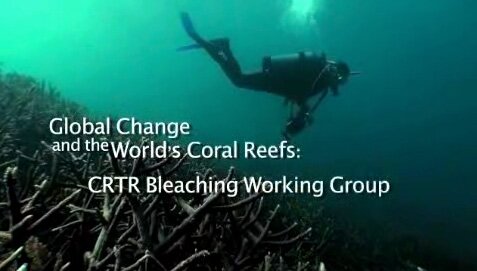|
 |
|
DVD - Coral reefs: A Casualty of climate change
|
| 27:50 |
|
|
|
 |
|
Bleaching Working Group members recounting their career history and highlights.
|
|
|
|
|
 |
|
EBM - Presenters and Participants
|
| 03:08 |
|
|
|
 |
|
EBM - Presenters and Participants
|
| 01:51 |
|
|
|
 |
|
EBM - Presenters and Participants
|
| 00:37 |
|
|
|
 |
|
EBM - Presenters and Participants
|
| 02:21 |
|
|
|
 |
|
EBM - Presenters and Participants
|
| 01:05 |
|
|
|
 |
|
EBM - Presenters and Participants
|
| 01:48 |
|
|
|
 |
|
EBM - Presenters and Participants
|
| 01:16 |
|
|
|
 |
|
EBM - Presenters and Participants
|
| 01:31 |
|
|
|
 |
|
EBM - Presenters and Participants
|
| 03:35 |
|
|
|
 |
|
Prof Paul Greenfield profiles the CRTR Program to the plenary audience of the 2009 GEF International Waters Conference, describing its contributions to local, national and international policy.
|
|
|
|
|
 |
|
Professor Iglesias-Prieto outlines the achievements of the CRTR Program in Mesoamerica at the 2009 GEF International Waters Conference.
|
|
|
|
|
 |
|
Deborah Cleland discusses ‘Reefs for People’ - a demonstration CD for a CRTR-developed model that predicts impacts on reefs from development and environmental pressures. She was involved in delivery of a workshop at the International Waters Conference which launched the CD and the model.
|
|
|
|
|
 |
|
A PhD scholar working with the Modelling and Decision Support Working Group, Jessica Melbourne- Thomas talks about her experiences at the 2009 GEF International Waters Conference.
|
|
|
|
|
 |
|
Prof Mumby discusses the marine response to climate change following delivery of a technical workshop at the International Waters Conference.
|
|
|
|
|
 |
|
Prof Gomez describes learnings from implementation of Marine Protected Areas in the Philippines, shared with colleagues at the International Waters Conference.
|
|
|
|
|
 |
|
Prof Sale explains why oceans must be high on the UNFCCC agenda.
|
|
|
|
|
 |
|
Prof Hoegh-Guldberg talks about what can be done to avert disaster for coral reefs.
|
|
|
|
|
 |
|
Prof Mumby discusses strategies to reduce the impact of climate change.
|
|
|
|
|
 |
|
Professor Gomez reflects on the proud achievements of the CoE during Phase 1 of the CRTR Program.
|
|
|
|
|
 |
|
Prof Iglesias-Prieto discusses the coastal protection provided to the Yucatan Peninsula by coral reefs, and the pressures these reefs face from groundwater pollution.
|
|
|
|
|
 |
|
The CRTR Restoration and Remediation Working Group aims to provide better advice on restoration to reef managers, thereby supporting natural recovery and healthier reefs.
|
|
|
|
|
 |
|
The CRTR Remote Sensing Working Group assesses the health of a reef from an aircraft or satellite sensor over large areas. Remote sensing can provide comprehensive information on changes to reef health, particularly in relation to climate change.
|
|
|
|
|
 |
|
The CRTR Modelling and Decision Support Working Group includes mathematicians and computer scientists who collect data from other CRTR groups and use it to create models of the way people work with coral reefs.
|
|
|
|
|
 |
|
The CRTR Disease Working Group identifies the impact of infectious diseases on coral reef sustainability worldwide. It also examines how climate change and warming oceans can trigger outbreaks of new diseases.
|
|
|
|
|
 |
|
The CRTR Connectivity Working Group assesses movement of individual organisms from one coral reef population to another. By understanding these interconnections, the identification of protected areas can be more effective.
|
|
|
|
|
 |
|
The CRTR Coral Bleaching Working Group researches why bleaching occurs. It also considers the large-scale, ecological consequences for a reef system if corals die.
|
|
|
|
|
 |
|
The Coral Reef Targeted Research & Capacity Building for Management (CRTR) Program is a leading international coral reef research initiative that provides a coordinated approach to credible, factual and scientifically-proven knowledge for improved coral reef management.
|
|
|
|
|
|